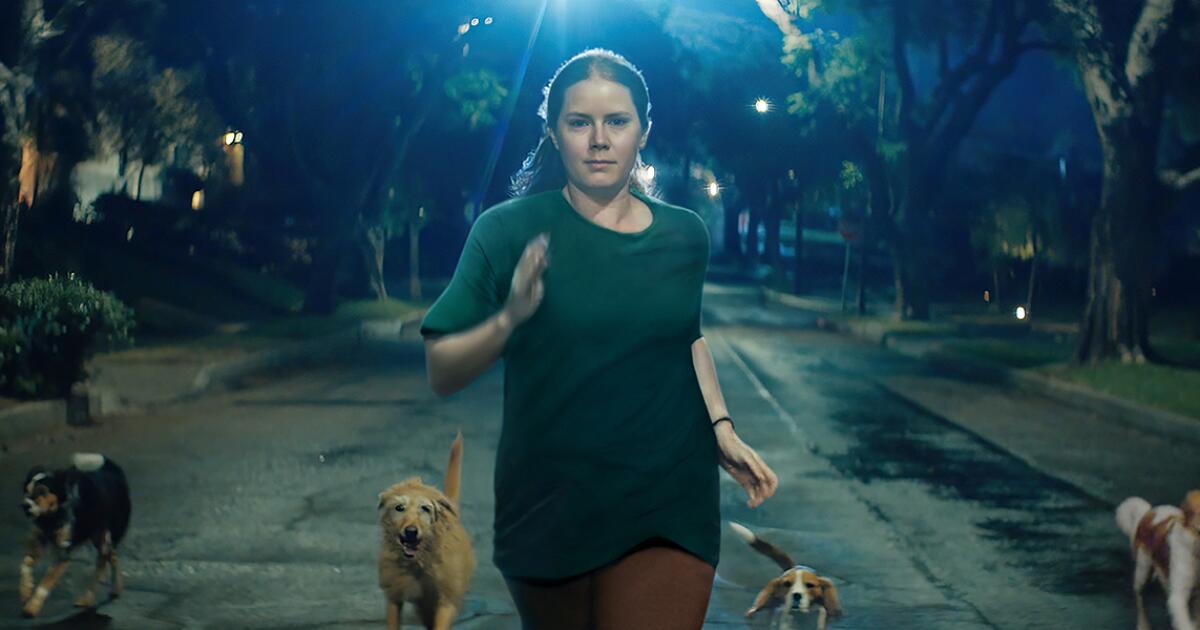“The one thing I learned doing this movie is don’t mansplain motherhood,” actor Scoot McNairy said onstage after Saturday’s world premiere of “Nightbitch” at the Toronto International Film Festival. “I hope that you guys learn all the things that I learned, which is shut up and listen.”
The film, from writer-director Marielle Heller, stars Amy Adams as an artist turned stay-at-home mom struggling with rage and resentment — and the nagging suspicion that she is turning into a dog.
Critics and awards pundits would be wise to heed the actor’s words when it comes to “Nightbitch,” one of the highest-profile films to premiere at the festival this year, and also one anticipated with a prevailing sense of “What the f— is this thing?” Was this a serious movie, or a gag from “30 Rock”? Leading up to Saturday’s premiere, speculation on social media mounted: Would the film, adapted from Rachel Yoder’s magical realist novel of the same name, finally win Adams an Oscar after six fruitless nominations? Or would it prove to be a train wreck and inspire a thousand excruciating dog-pun headlines?
The trailer, released last week, did not exactly dampen the speculation. It made “Nightbitch” seem like a wacky mom-com version of “Teen Wolf” rather than what it is: a surreal, insightful film about the joys and anguish of motherhood, and the sometimes disturbing ways that becoming a parent can transform women’s minds, bodies, emotional lives and entire sense of self — even when they aren’t growing extra nipples or extra-sharp canine teeth.
“The isolation … and the transformation of motherhood and parenthood, it’s something that is a shared experience, and yet it isn’t shared,” said Adams during Saturday’s post-premiere Q&A.
Adams’ character — never named and listed in the credits as “Mother” — has put her once-promising career on hold to raise their adorable yet sleep-resistant 2-year-old son. Her husband (McNairy), also nameless, is often away on work trips, leaving Mother to whip up countless pots of macaroni and cheese and take her toddler to insipid singalongs at the local library, where she eyes the room longingly in search of like-minded mothers to befriend. Her husband is well-meaning but infuriatingly clueless, at one point telling Adams’ character that he’d love to stay at home all day instead of working. (It does not go well.)
As her frustration and anger build, Mother starts to notice some strange physical changes: a heightened sense of smell, a craving for raw meat, a patch of thick white fur on her lower back. Initially disturbed, she eventually decides to embrace her feral side — leading to a confrontation with her husband about the state of their relationship.
When he asks what happened to the interesting, weird girl he married, Mother replies, “She died in childbirth.”
“Nightbitch” is a delicate tonal balancing act, and it largely works because of Adams, who fully commits to the bit and can also pivot from sunny sweetness to incandescent rage at the flick of a switch. In one of the film’s most memorable sequences, she sings along to the “Weird Al” Yankovic classic “Dare to Be Stupid.” She does just that — and pulls it off with aplomb.
Initial reactions to the film seemed determined to paint the film as an off-putting mess. An early headline in Variety declared “Amy Adams’ ‘Nightbitch’ Weirds Out TIFF With Dog Poop, Cat Killing and Shower Menstruation,” which is both oddly squeamish (what, exactly, is so offensive about menstruating in the shower?) and also underestimates the festival-going audience’s tolerance for dead animals and bodily secretions (both featured prominently in Ron Howard’s survivalist drama “Eden,” which screened immediately before “Nightbitch.”)
Instant reactions like this failed to consider that the audience’s groans might not be of disgust, but recognition. I know that I audibly reacted to a sequence in which Husband offers to give their son a bath but then interrupts Mother’s couch nap session with a thousand questions he could easily answer on his own, rendering the whole gesture pointless. During the cathartic scene in which Mother confronts Husband over his cluelessness, a woman seated near me exclaimed, “It’s about time!”
As more reviews have trickled in, the response has been mixed. Maybe Heller didn’t go dark enough. Maybe the dog metaphor is too strained. Maybe it’s all going to be off-putting to awards voters.
None of this should be surprising, given the subject matter. Like every other book, film, TV show or think piece that attempts to say something about motherhood, “Nightbitch” will be polarizing. It will inspire a billion hot takes, many of them bad, and may even win some awards. It won’t be for everyone. A little like motherhood itself.

